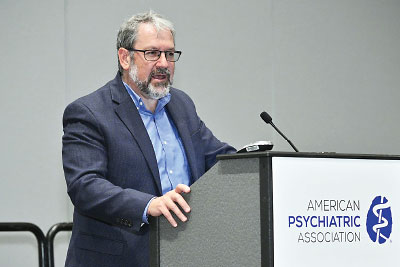NIMH Director Outlines Current, Future Priorities
Abstract
The pandemic worsened an already bad national mental health crisis. Now is the time to highlight how psychiatry research can improve the lives of people living with mental illness and those who care for them, said Joshua Gordon, M.D., Ph.D.
The United States is in an unprecedented moment in time, said National Institute of Mental Health (NIMH) Director Joshua Gordon, M.D., Ph.D., during his remarks at APA’s 2023 Annual Meeting in May. The COVID-19 pandemic has exacerbated an already bad national mental health crisis, particularly among youth. Still, he said, there are signs of hope and opportunity for psychiatry.
Gordon highlighted the 2021 advisory from the U.S. Surgeon General on the mental health crisis that youth in the country are facing as well as President Biden’s remarks during the State of the Union address that leaders on both sides of the aisle agree on the importance of addressing mental health challenges.

Joshua Gordon, M.D., Ph.D., highlighted the ALACRITY program—which supports medical centers to build transdisciplinary clinics that provide innovative services to patients—as one of NIMH’s efforts aimed at accelerating the application of research findings into practice in the face of a growing mental health crisis.
Gordon then discussed NIMH’s priorities for the coming years. These include transforming youth mental health care to better address health disparities and suicide prevention, as well as harnessing computational power to prospectively identify which people may respond to antidepressant treatment. He assured the audience that these examples represented a small part of NIMH’s diverse research portfolio, which continues to support basic, translational, and clinical research.
To address the immediate mental health needs of U.S. youth, Gordon described a new NIMH effort aimed at speeding the bench-to-bedside pipeline called ALACRITY, or Advanced Laboratories for Accelerating the Reach and Impact of Treatments for Youth and Adults with Mental Illness. Through ALACRITY, research centers can establish transdisciplinary health clinics that offer innovative care to patients—for example, using mobile apps and other digital tools as the primary vehicle of depression care for youth and young adults—in real-world settings.
Gordon said that NIMH is supporting 14 ALACRITY clinics across the country, with more funding to come. He added that the program is set up so that each center can apply for renewal only once, so that ALACRITY will continually be inviting new investigators and fresh ideas. In a related project, NIMH is also funding practice-based research clinics with a specific focus on suicide prevention; six such clinics have been funded.
Gordon ended his talk by noting that 2024 will mark the 75th anniversary of NIMH. To celebrate, beginning this fall the institute will launch a year-long series of symposia, lectures, and other events (including at next year’s APA Annual Meeting) to celebrate past, present, and future successes in mental health research.
He noted that he hopes that as more people recognize the mental health challenges Americans face, psychiatry researchers will call attention to the ways research has led to new hope for people living with mental illness.
If the field cannot make the case that mental health research pays off, there will be less enthusiasm to make the investments in mental health down the road, he cautioned.
“To make mental health a priority, mental health research needs to be a priority,” Gordon said. ■



